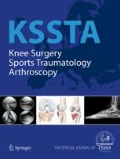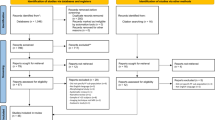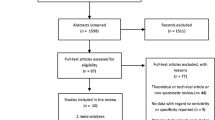Abstract
Purpose
To assess the diagnostic test accuracy of magnetic resonance imaging (MRI), magnetic resonance arthrography (MRA) and computed tomography arthrography (CTA) for the detection of chondral lesions of the patellofemoral and tibiofemoral joints.
Methods
A review of published and unpublished literature sources was conducted on 22nd September 2011. All studies assessing the diagnostic test accuracy (sensitivity/specificity) of MRI or MRA or CTA for the assessment of adults with chondral (cartilage) lesions of the knee (tibiofemoral/patellofemoral joints) with surgical comparison (arthroscopic or open) as the reference test were included. Data were analysed through meta-analysis.
Results
Twenty-seven studies assessing 2,592 knees from 2,509 patients were included. The findings indicated that whilst presenting a high specificity (0.95–0.99), the sensitivity of MRA, MRI and CTA ranged from 0.70 to 0.80. MRA was superior to MRI and CTA for the detection of patellofemoral joint chondral lesions and that higher field-strength MRI scanner and grade four lesions were more accurately detected compared with lower field-strength and grade one lesions. There appeared no substantial difference in diagnostic accuracy between the interpretation from musculoskeletal and general radiologists when undertaking an MRI review of tibiofemoral and patellofemoral chondral lesions.
Conclusions
Specialist radiological imaging is specific for cartilage disease in the knee but has poorer sensitivity to determine the therapeutic options in this population. Due to this limitation, there remains little indication to replace the ‘gold-standard’ arthroscopic investigation with MRI, MRA or CTA for the assessment of adults with chondral lesions of the knee.
Level of evidence
II.



Similar content being viewed by others
References
Adams ME, Li DK, McConkey JP, Davidson RG, Day B, Duncan CP et al (1991) Evaluation of cartilage lesions by magnetic resonance imaging at 0.15 T: comparison with anatomy and concordance with arthroscopy. J Rheumatol 18:1573–1580
Bland M (2000) Introduction to medical statistics, 3rd edn. Oxford University Press, Oxford
Bredella MA, Tirman PF, Peterfy CG, Zarlingo M, Feller JF, Bost FW et al (1999) Accuracy of T2-weighted fast spin-echo MR imaging with fat saturation in detecting cartilage defects in the knee: comparison with arthroscopy in 130 patients. AJR Am J Roentgenol 172:1073–1080
Broderick LS, Turner DA, Renfrew DL, Schnitzer TJ, Huff JP, Harris C (1994) Severity of articular cartilage abnormality in patients with osteoarthritis: evaluation with fast spin-echo MR vs arthroscopy. AJR Am J Roentgenol 162:99–103
Burstein D, Gray M (2003) New MRI techniques for imaging cartilage. J Bone Joint Surg 85-A(Suppl 2):70–77
Cardello P, Gigli C, Ricci A, Chiatti L, Voglino N, Pofi E (2009) Retears of postoperative knee meniscus: findings on magnetic resonance imaging (MRI) and magnetic resonance arthrography (MRA) by using low and high field magnets. Skeletal Radiol 38:149–156
Crawford R, Walley G, Bridgman S, Maffulli N (2007) Magnetic resonance imaging versus arthroscopy in the diagnosis of knee pathology, concentrating on meniscal lesions and ACL tears: a systematic review. Br Med Bull 84:5–23
Crema MD, Roemer FW, Marra MD, Burstein D, Gold GE, Eckstein F et al (2011) Articular cartilage in the knee: current MR imaging techniques and applications in clinical practice and research. Radiographics 31:37–61
Disler DG, McCauley TR, Kelman CG, Fuchs MD, Ratner LM, Wirth CR et al (1996) Fat-suppressed three-dimensional spoiled gradient-echo MR imaging of hyaline cartilage defects in the knee: comparison with standard MR imaging and arthroscopy. AJR Am J Roentgenol 167:127–132
Disler DG, McCauley TR, Wirth CR, Fuchs MD (1995) Detection of knee hyaline cartilage defects using fat-suppressed three-dimensional spoiled gradient-echo MR imaging: comparison with standard MR imaging and correlation with arthroscopy. AJR Am J Roentgenol 165:377–382
Eckstein F, Charles HC, Buck RJ, Kraus VB, Remmers AE, Hudelmaier M et al (2005) Accuracy and precision of quantitative assessment of cartilage morphology by magnetic resonance imaging at 3.0 T. Arthritis Rheum 52:3132–3136
Figueroa D, Calvo R, Vaisman A, Carrasco MA, Moraga C, Delgado I (2007) Knee chondral lesions: incidence and correlation between arthroscopic and magnetic resonance findings. Arthroscopy 23:312–315
Flanigan DC, Harris JD, Trinh TQ, Siston RA, Brophy RH (2010) Prevalence of chondral defects in athletes’ knees: a systematic review. Med Sci Sports Exerc 42:1795–1801
Friemert B, Oberländer Y, Schwarz W, Häberle HJ, Bähren W, Gerngross H et al (2004) Diagnosis of chondral lesions of the knee joint: can MRI replace arthroscopy? A prospective study. Knee Surg Sports Traumatol Arthrosc 12:58–64
Gagliardi JA, Chung EM, Chandnani VP, Kesling KL, Christensen KP, Null RN et al (1994) Detection and staging of chondromalacia patellae: relative efficacies of conventional MR imaging, MR arthrography, and CT arthrography. AJR Am J Roentgenol 163:629–636
Ghanem I, Abou Jaoude S, Kharrat K, Dagher F (2002) Is MRI effective in detecting intraarticular abnormalities of the injured knee? J Med Liban 50:168–174
Giovagnoni A, Valeri G, Ercolani P, Paci E, Carloni S, Soccetti A (1995) Magnetic resonance arthrography in chondral disease of the knee. Radiol Med 90:219–225
Gold GE, Bergman AC, Pauly JM, Lang P, Butts RK, Beaulieu CF et al (1998) Magnetic resonance imaging of knee cartilage repair. Top Magn Imaging 9:377–392
Gückel C, Jundt G, Schnabel K, Gächter A (1995) Spin-echo and 3D gradient-echo imaging of the knee joint: a clinical and histopathological comparison. Eur J Radiol 21:25–33
Gylys-Morin VM, Hajek PC, Sartoris DJ, Resnick D (1987) Articular cartilage defects: detectability in cadaver knees with MR. AJR Am J Roentgenol 45:1153–1157
Harman M, Ipeksoy U, Dogan A, Arslan H, Etlik O (2003) MR arthrography in chondromalacia patellae diagnosis on a low-field open magnet system. Clin Imaging 27:194–199
Heron CW, Calvert PT (1992) Three-dimensional gradient-echo MR imaging of the knee: comparison with arthroscopy in 100 patients. Radiology 183:839–844
Hodler J, Resnick D (1992) Chondromalacia patellae. AJR Am J Roentgenol 158:106–107
Hughes RJ, Houlihan-Burne DG (2011) Clinical and MRI considerations in sports-related knee joint cartilage injury and cartilage repair. Semin Musculoskelet Radiol 15:69–88
Kawahara Y, Uetani M, Nakahara N, Doiguchi Y, Nishiguchi M, Futagawa S, Kinoshita Y et al (1998) Fast spin-echo MR of the articular cartilage in the osteoarthritic knee. Correlation of MR and arthroscopic findings. Acta Radiol 39:120–125
Kettunen JA, Visuri T, Harilainen A, Sandelin J, Kujala UM (2005) Primary cartilage lesions and outcome among subjects with patellofemoral pain syndrome. Knee Surg Sports Traumatol Arthrosc 13:131–134
Lee SH, Suh JS, Cho J, Kim SJ (2001) Evaluation of chondromalacia of the patella with axial inversion recovery-fast spin-echo imaging. J Magn Reson Imaging 13:412–416
Macarini L, Perrone A, Murrone M, Marini S, Stefanelli M (2004) Evaluation of patellar chondromalacia with MR: comparison between T2-weighted FSE SPIR and GE MTC. Radiol Med 108:159–171
Magee T, Shapiro M, Williams D (2004) Usefulness of simultaneous acquisition of spatial harmonics technique for MRI of the knee. AJR Am J Roentgenol 182:1411–1415
Murphy BJ (2001) Evaluation of grades 3 and 4 chondromalacia of the knee using T2* weighted 3D gradient echo articular cartilage images. Skeletal Radiol 30:305–311
Noyes FR, Stabler CL (1989) A system for grading articular cartilage lesions at arthroscopy. Am J Sports Med 17:505–513
Oei EH, Nikken JJ, Verstijnen AC, Ginai AZ, Hunink MGM (2003) MR imaging of the menisci and cruciate ligaments: a systematic review. Radiology 226:837–848
Outerbridge RE (1961) The etiology of chondromalacia patellae. J Bone Joint Surg 43-B:752–757
Perdikakis E, Karachalios T, Katonis P, Karantanas A (2011) Comparison of MR-arthrography and MDCT-arthrography for detection of labral and articular cartilage hip pathology. Skeletal Radiol 40:1441–1447
Pihlajamäki HK, Kuikka PI, Leppänen VV, Kiuru MJ, Mattila VM (2010) Reliability of clinical findings and magnetic resonance imaging for the diagnosis of chondromalacia patellae. J Bone Joint Surg 92-A:927–934
Rand T, Brossmann J, Pedowitz R, Ahn JM, Haghigi P, Resnick D (2000) Analysis of patellar cartilage. Comparison of conventional MR imaging and MR and CT arthrography in cadavers. Acta Radiol 41:492–497
Recht MP, Piraino DW, Paletta GA, Schils JP, Belhobek GH (1996) Accuracy of fat-suppressed three-dimensional spoiled gradient-echo FLASH MR imaging in the detection of patellofemoral articular cartilage abnormalities. Radiology 198:209–212
Recht M, Bobic V, Burstein D, Disler D, Gold G, Gray M (2001) Magnetic resonance imaging of articular cartilage. Clin Orthop Relat Res 391:S379–S396
Reiser M, Karpf PM, Bernett P (1982) Diagnosis of chondromalacia patellae using CT arthrography. Eur J Radiol 2:181–186
Riel KA, Reinisch M, Kersting-Sommerhoff B, Hof N, Merl T (1999) 0.2-Tesla magnetic resonance imaging of internal lesions of the knee joint: a prospective arthroscopically controlled clinical study. Knee Surg Sports Traumatol Arthrosc 7:37–41
Rosas HG, De Smet AA (2009) Magnetic resonance imaging of the meniscus. Top Magn Reson Imaging 20:151–173
Russell GGQ, Johnson M, Johnston DWC, Arnett G, Swersky J (1994) Imaging studies in surgically proven chondromalacia patellae. Clin J Sport Med 4:11–13
Shahriaree H (1985) Chondromalacia. Contemp Orthop 11:27–39
Spahn G, Wittig R, Kahl E, Klinger HM, Mückley T, Hofmann GO (2007) Evaluation of cartilage defects in the knee: validity of clinical, magnetic-resonance-imaging and radiological findings compared with arthroscopy. Unfallchirurg 110:414–424
Tyrrell RL, Gluckert K, Pathria M, Modic MT (1988) Fast three-dimensional MR imaging of the knee: comparison with arthroscopy. Radiology 166:865–872
Vallotton JA, Meuli RA, Leyvraz PF, Landry M (1995) Comparison between magnetic resonance imaging and arthroscopy in the diagnosis of patellar cartilage lesions: a prospective study. Knee Surg Sports Traumatol Arthrosc 3:157–162
Vande Berg BC, Lecouvet FE, Poilvache P, Maldague B, Malghem J (2002) Spiral CT arthrography of the knee: technique and value in the assessment of internal derangement of the knee. Eur Radiol 12:1800–1810
von Engelhardt LV, Lahner M, Klussmann A, Bouillon B, Dàvid A, Haage P et al (2010) Arthroscopy vs. MRI for a detailed assessment of cartilage disease in osteoarthritis: diagnostic value of MRI in clinical practice. BMC Musculoskelet Disord 20:75
von Engelhardt LV, Schmitz A, Burian B, Pennekamp PH, Schild HH, Kraft CN (2008) 3-Tesla MRI vs. arthroscopy for diagnostics of degenerative knee cartilage diseases: preliminary clinical results. Orthopade 37:914–922
Whiting P, Rutjes AW, Dinnes J, Reitsma J, Bossuyt PM, Kleijnen J (2004) Development and validation of methods for assessing the quality of diagnostic accuracy studies. Health Technol Assess 8:1–234
Whiting PF, Weswood ME, Rutjes AW, Reitsma JB, Bossuyt PN, Kleijnen J (2006) Evaluation of QUADAS, a tool for the quality assessment of diagnostic accuracy studies. BMC Med Res Methodol 6:9
Yoshioka H, Stevens K, Hargreaves BA, Steines D, Genovese M, Dillingham MF et al (2004) Magnetic resonance imaging of articular cartilage of the knee: comparison between fat-suppressed three-dimensional SPGR imaging, fat-suppressed FSE imaging, and fat-suppressed three-dimensional DEFT imaging, and correlation with arthroscopy. J Magn Reson Imaging 20:857–864
Zaragoza E, Lattanzio PJ, Beaule PE (2009) Magnetic resonance imaging with gadolinium arthrography to assess acetabular cartilage delamination. Hip Int 19:18–23
Acknowledgments
We would like to thank the Information Services at the University of East Anglia, UK, for their assistance in gathering the papers required for this study.
Conflict of interest
No author declares a competing interest to this paper.
Author information
Authors and Affiliations
Corresponding author
Additional information
Registration: CRD42011001342.
Rights and permissions
About this article
Cite this article
Smith, T.O., Drew, B.T., Toms, A.P. et al. Accuracy of magnetic resonance imaging, magnetic resonance arthrography and computed tomography for the detection of chondral lesions of the knee. Knee Surg Sports Traumatol Arthrosc 20, 2367–2379 (2012). https://doi.org/10.1007/s00167-012-1905-x
Received:
Accepted:
Published:
Issue Date:
DOI: https://doi.org/10.1007/s00167-012-1905-x




